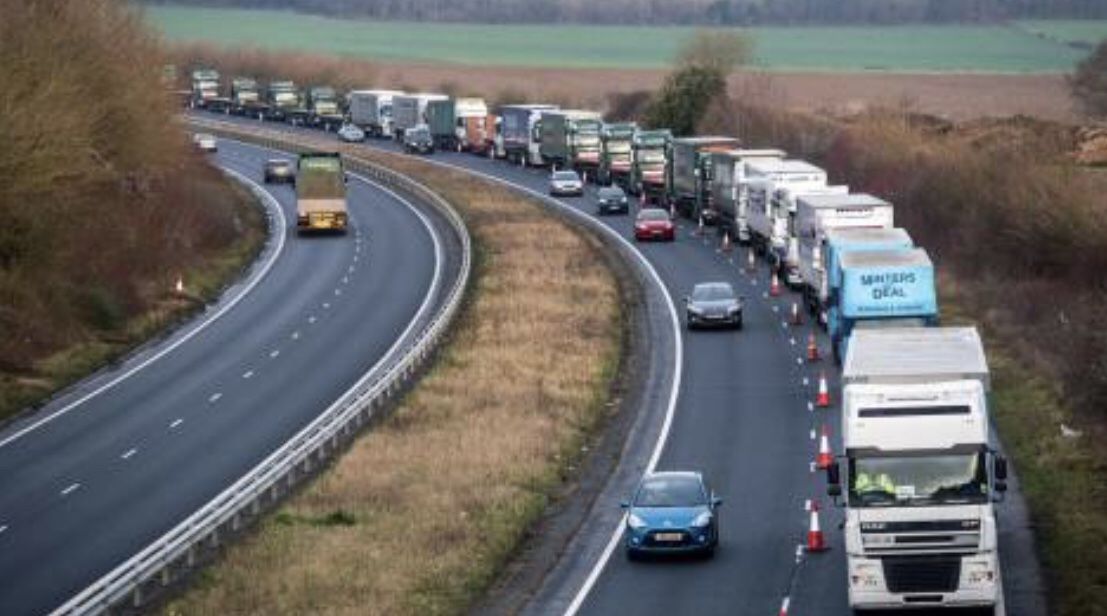Six-day queues into Dover feared under no-deal Brexit scenario
Government-ordered study finds just 80-second customs checks would mean permanent gridlock.
Trucks would face six-day queues to board ferries at Dover if new customs checks in the event of a no-deal Brexit were to delay each vehicle by just 70 seconds, according to government-commissioned research.

A summary of the analysis obtained by the Financial Times claims extra processing time of 80 seconds per truck would lead to “no recovery” — described by an official as widespread permanent gridlock.
The research, carried out by academics at University College London for the Department for Transport, will add to misgivings about the potential disruption of a disorderly exit from the EU. The research was presented to ministers in 2017 but never published.
On Monday the DfT conducted a live rehearsal of an emergency traffic system that will be introduced to prevent congestion at Dover in such circumstances. The trial used just 89 trucks to test out the disused Manston Airport, which will be used as a car park for 6,000 trucks under the contingency plans.
The Port of Dover, which handles up to 10,000 trucks a day, believes no-deal Brexit would lead to 17-mile tailbacks, while the government has estimated there will be an extra 200m customs declarations a year.
The UCL research was based on the impact of different processing times for outbound journeys using Dover’s existing layout and traffic flows. It anticipates that extra customs checks of up to 40 seconds per vehicle would have no impact on the queueing time for outward journeys through Dover.
However, that changes dramatically when the additional delays are only slightly longer. With a further 60 seconds of checks, officials anticipate queues of six to eight hours on Tuesdays, Wednesdays and Thursdays, when traffic is particularly heavy.
If delays reach 70 seconds per truck, a queue of between 1,200 and 2,724 heavy goods vehicles is expected, leading to tailbacks taking six days. “[The queue] starts Monday evening and ends by Saturday noon,” according to the analysis.
If the processing time goes up to 80 seconds the result would simply be “no recovery”, it says.
“‘No recovery’ would mean the whole country is in a traffic jam,” said one official.
A DfT spokesperson said: “This analysis was undertaken by a third-party consultant two years ago and is not the current analysis on which the government is making its Brexit preparations.”
A department official said the UCL research was only one of “a number of documents commissioned” since the 2016 EU referendum. “Our main priority is to ensure that we get agreement with the EU, and, failing that, getting an agreement with the French authorities.”
Separate research by Imperial College London has predicted “paralysis” on the M20 motorway and A20 trunk road if new customs delays are introduced.
Ke Han of Imperial predicted nearly five hours of traffic delays in Kent at peak times, with an extra two minutes spent on each vehicle at the border tripling existing queues on the M20/A20 to 29 miles.
Current security and passport checks take up to two minutes, according to one estimate by Dr Han, but freight vehicles do not have to complete customs declarations, which could change under a no-deal Brexit.
Updated advice to government departments from officials last week warned that there could be six months of reduced access and delays at Dover and nearby Folkestone if there was no deal. That was dismissed as “Project Fear on steroids” by Andrew Bridgen, a Tory Brexiter MP.
Source: FT
You must be logged in to post a comment.